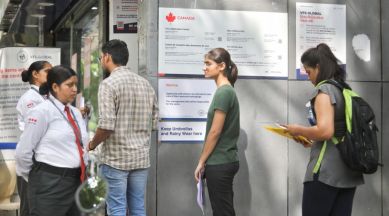Stay updated with the latest - Click here to follow us on Instagram
Amid souring ties, visa suspension leaves Indians in Canada worried
A large number of Person of Indian Origin (PIO)s are Canadian citizens and do not possess the Overseas Indian Citizen (OCI) card. They, however, visit India every year to meet their families, elderly parents, or to attend social engagements, with some even having businesses in the country.

An escalating diplomatic row over the murder of Khalistani leader, Hardeep Singh Nijjar, in Vancouver, has left Person of Indian Origin (PIO)s — especially those from Punjab, who account for around 70% of the total Indian-origin population in Canada — worried.
A large number of PIOs are Canadian citizens and do not possess the Overseas Indian Citizen (OCI) card. They, however, visit India every year to meet their families, elderly parents, or to attend social engagements, with some even having businesses in the country.
Kamal Preet Singh of Jalandhar’s Nakodar area, who is now settled in Brampton, Canada, didn’t mince his words while stating his concern at the current situation. “We have some acres of land in India and need to come here every year to complete formalities related to its leasing. This year, too, we were scheduled to visit Punjab in November, and our visa process was underway in Canada. However, with the suspension of visa services by the Indian government now, we have no choice but to wait.” He urged the government not to inconvenience the public for political reasons.
Sonu Arora, who resides in Toronto and owns a fuel pump station, expressed his concerns about his parents’ proposed plans to visit India in November to settle some property issues in Jalandhar. Arora said that he was now unsure whether his parents get the required permission to travel. Arora’s family has been living in Canada for the past two decades and are Canadian citizens without OCI status.
Community activist, Manan Gupta, who is based out of Brampton, emphasised on the importance of maintaining a positive relationship between India and Canada, given their mutual dependency on each other. With a large Indian population residing in Canada and the country being an attractive destination for Indian students, suspension of visa service from either side was likely to have a significant impact on Indians living in Canada.
Gupta underscored the need to strengthen people-to-people ties to address minor disagreements between the two nations and avoid spreading fear and anxiety among the Punjabi diaspora, many of whom have families in India.
According to the 2021 census, Canada’s population stood at approximately 37 million, with nearly 1.4 million of them being Indian ethnic or cultural origin, accounting for about 3.7% of the country’s total population. More than 770,000 people — among the 1.4 million identified as Sikh, making for about 2% of Canada’s population.
Additionally, there are thousands of non-Sikh Punjabis settled in Canada, including many citizens without OCI cards.
According to Immigration, Refugees, and Citizenship Canada (IRCC) data for 2023, from January to June, 84,425 new permanent residents arrived in Canada from India. In 2022, a total of 35,608 Indians were granted Canadian citizenship, and in the first two quarters of 2023, at least 2.99 lakh visitor visas were approved for Indians, along with 1.75 lakh student visas being issued separately.
According to the 2021 Canadian census, visitors from India rank as Canada’s fourth-largest international air travel market. Tourists from India spent $3.4 billion, the most of any group visiting Canada, while Canadians visiting India spent $93 million in 2021.
An educational expert in Jalandhar, Tirath Singh, who sends numerous students to Canada each year, expressed concerns about the potential impact of the visa suspension on the education industry. He noted that representatives from Canadian colleges visited India regularly, helping students make informed decisions about their education in their country. If the visa suspension continues, then it would have a serious impact on the educational industry, he said.
SD Sharma, on the other hand, said that he was eagerly waiting for his son’s visit to India in December. He, now however, is apprehensive about his son being able to make the trip, “My son’s visa process was underway. But now, our government has suspended visa services in Canada. We don’t know what will happen next or how my son, who visited us two years ago, will be able to visit us,” Sharma said.
A senior journalist based in Canada, on the condition of anonymity, questioned the practice of the Canadian authorities of turning a blind eye towards anti-India activities, while expecting India not to raise questions about them.
India is a significant contributor to Canada’s education sector, as it sends the largest number of foreign students to Canadian colleges and universities. Additionally, Indian officials are issuing visas in three locations in Canada: Ottawa, Toronto, and Vancouver, covering all Canadian states and federal territories.
Maninder Gill, the president Friends of Canada & India Foundation said, “We are very disappointed by the deterioration of Indo-Canadian relationship. As an organisation, we have always worked towards improving this bilateral relationship. The stopping of visa facility by India for Canadian citizens is deeply problematic, especially for the Indian diaspora living there.
A lot of people travel to India in the winter season, to look after their properties and to participate in family functions. The NRIs contribute to the local economy, especially in the state of Punjab. A majority of NRIs love and respect their Indian heritage. It is a cause of concern that everyone has to suffer due to actions of the fringe radical and extremist elements. Both the countries should work towards normalising the relationship.”